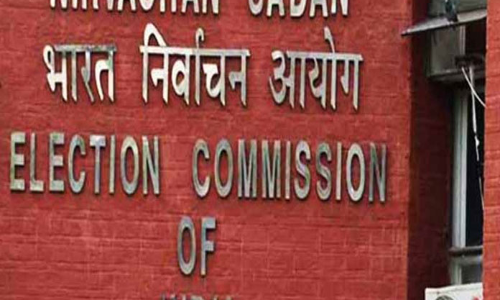Live
- Every district to have cybercrime police station
- 7 lakh devotees to have darshan in 10 days
- Role of Telugus in framing statute noteworthy: CM
- New Year jolt to KTR; ED to grill on Jan 7
- Etikoppaka toys tableau to roll along Kartavya Path on Republic Day
- H-1B visa: Elon Musk, Ramaswamy face Trump supporters' wrath
- TG Assembly to pay homage to former PM Manmohan Singh
- Naidu, Lokesh & Revanth to join world leaders at Davos meet
- Nation bids adieu to Dr Singh
- Nitish Kumar Reddy Celebrates Century with Pushpa’s Iconic "Taggede Le" Gesture, A First for Telugu Cinema
Just In

The Speaker of the Legislature is a political creature and, therefore, generally he is not impartialMost of the times he takes a view which is in the interest of the party to which he belongs
The Speaker of the Legislature is a political creature and, therefore, generally he is not impartial.Most of the times he takes a view which is in the interest of the party to which he belongs.
In Kihota Hollohan verdict;
The majority Judges rejected the contention that the investiture of adjudicatory functions in the Speaker/Chairman is by itself invalid on the ground of political bias and lack of impartiality.
The majority view on the role of Speaker/Chairmen:
"The Chairmen or Speakers hold a pivotal position in the scheme of parliamentary democracy and are guardians of the rights and privileges of the House.They are expected to and do take far reaching decisions in the functioning of parliamentary democracy.Vesture of power to adjudicate questions under the Xth Schedule in such constitutional functionaries should not be considered exceptionable".
The minority view, on the other hand;. The speaker cannot be given the role of the 'sole' arbiter in the defection cases as it would be against the Basic structure of the Constitution.The Speaker depends continuously on the support of the majority party in the House, and so he cannot be regarded as an independent adjudicatory authority.Suggestions have, therefore, been made that the Act should be amended to bar all defections ----------individual or group ----- and that the function to decide upon the question of disqualification arising out of defection should be taken away from the Speakers and be vested in the Election Commission which is an autonomous, non-political, non-partisan body.
No prescribed time limit before which decision on disqualification is required to be made: There is a larger demand from different sections of politically conscious society for an amendment to prescribe a time limit before which decision on disqualification due to defection needs to be made.
The Speaker/Chairmen is deliberately following dilatory practices for deciding on the disqualification. Hence, to check this procrastination involved in the decision-making process there is a demand that a time limit of 3 months should be prescribed before which a decision on the disqualification is to be made.
Anti-defection law does not apply to Rajya Sabha, President and Vice-President elections: The elections to the House of Rajya Sabha,to the President and to the Vice-President of India are conducted through the process of proportional representation by means of single transferable vote.
Hence, these elections do not come under the ambit of Anti-Defection law.Also, the Supreme Court in two landmark judgments: Kuldip Nayar v. Union of India, and Pashupati Nath Sukul v. Nem Chandra Jain, held that: Anti-defection law does not apply to the Council of States i.e, Rajya Sabha, President and Vice-President Elections.
Hence, there is a unanimous demand that the scope of Anti-Defection law should be expanded and it should be made applicable to the areas where its application is now barred.
Conclusion
Defection is not only anti-democratic but even a form of corruption for underlying motivation is personal gain and not any conscientious change of heart on the part of the defecting legislator.
At the election, people vote for a particular candidate on the basis of the party he belongs to at the time of his election. It is reasonable to contend that if the legislator seeks to change his political affiliations after election, he must resign from his membership of the legislature and seek fresh endorsement by the voters on the basis of his newly chosen platform.
The lacunae existing in the Anti-Defection law can be rectified and it can be made more effective if the superintendence or adjudicatory function is vested in the Election Commission of India.
The President in case of Parliament, and the Governor in case of State Legislatures, may refer the matter to the Election Commission of India. This seems the most viable way to avoid politically motivated decisions by the Speakers when members of one political party defect to another.
A slew of petitions were filed before several High Court across India and also in the Apex Court to ensure much needed amendment to the law, however, law making is the sole responsibility of the legislature and if the legislature abdicates its responsibility and the executive of the day is unwilling for a change in the status quo courts should take the onus upon themselves and direct the other organs of the government to frame laws to plug any loopholes existing in the laws in operation.
The existing anti-defection law has outlived its utility and therefore an amendment incorporating requisite changes to the Anti-Defection law is the need of the hour to safeguard our democracy and to uphold the aspirations of the electorate.

© 2024 Hyderabad Media House Limited/The Hans India. All rights reserved. Powered by hocalwire.com







